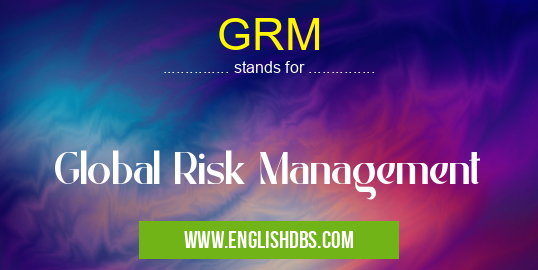What does GRM mean in MANAGEMENT
GRM stands for Global Risk Management. It is a comprehensive approach to identifying, assessing, and mitigating risks that have the potential to impact an organization's operations, financial performance, and reputation.

GRM meaning in Management in Business
GRM mostly used in an acronym Management in Category Business that means Global Risk Management
Shorthand: GRM,
Full Form: Global Risk Management
For more information of "Global Risk Management", see the section below.
» Business » Management
Key Concepts
- Identification: Identifying potential risks that could affect the organization.
- Assessment: Evaluating the likelihood and potential impact of identified risks.
- Mitigation: Developing and implementing strategies to reduce or eliminate the impact of risks.
- Monitoring: Continuously monitoring risks and assessing their potential impact.
Importance of GRM
Effective GRM is crucial for businesses of all sizes, as it helps:
- Protect against financial losses: Mitigating risks reduces the likelihood of unexpected expenses or revenue disruptions.
- Maintain operational stability: Identifying and addressing risks minimizes disruptions and ensures smooth business operations.
- Enhance decision-making: A comprehensive understanding of risks enables informed decision-making and risk-based planning.
- Improve reputation: Managing risks effectively helps businesses maintain a positive reputation and trust among stakeholders.
- Comply with regulations: GRM frameworks often align with industry regulations, ensuring compliance and avoiding legal liabilities.
Essential Questions and Answers on Global Risk Management in "BUSINESS»MANAGEMENT"
What is Global Risk Management (GRM)?
GRM encompasses comprehensive strategies and practices organizations implement to proactively identify, assess, and mitigate risks that could impact their operations, reputation, and financial stability. It involves establishing a framework to manage risks across all business functions and levels.
Why is GRM important?
GRM enables organizations to:
- Anticipate and prepare for potential risks
- Minimize the negative impacts of risks
- Enhance decision-making and strategic planning
- Protect their reputation and stakeholder trust
- Comply with regulatory and industry standards.
What are the key principles of GRM?
The principles of GRM include:
- A holistic approach to risk management
- Integration of risk management into all business processes
- Continuous monitoring and evaluation of risks
- Transparent and accountable risk reporting
- A strong risk culture.
How does GRM differ from traditional risk management?
GRM takes a more comprehensive and proactive approach, focusing on:
- Identifying emerging risks and opportunities
- Assessing risks across all business functions
- Integrating risk management into strategic planning
- Establishing a risk framework that aligns with the organization's objectives.
What are the benefits of implementing GRM?
Benefits of GRM include:
- Improved risk visibility and control
- Enhanced resilience and adaptability
- Increased operational efficiency
- Reduced costs associated with risk events
- Improved stakeholder confidence.
Final Words: GRM is a critical component of modern business management. By adopting a proactive approach to risk management, organizations can enhance their resilience, protect their assets, and create a more sustainable and successful future. Effective GRM requires a collaborative effort from all stakeholders, including management, employees, and external partners.
GRM also stands for: |
|
| All stands for GRM |
